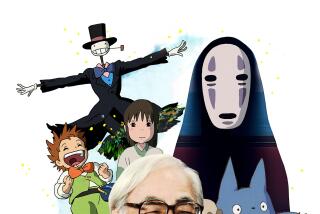MOVIE REVIEW : A Monumental ‘Human Condition’ Returns
- Share via
Masaki Kobayashi’s near-10-hour, three-part “Human Condition” (“Ningen No Joken”) trilogy is one of the monumental achievements in motion-picture history. It is also one of the most obscure, for the trilogy--”No Greater Love,” “Road to Eternity” and “A Soldier’s Prayer”--suffered from poor international distribution upon its completion in 1961. Having regained its rights to “The Human Condition,” the venerable Shochiku Film Co. presented it at the old Kabuki Theater on Adams at Crenshaw in 1970. Now, 20 years later, “The Human Condition” returns today to the Little Tokyo Cinemas.
It is stupendous not only as a kind of ultimate indictment of man’s inhumanity to man but is also virtually unique as a massive reminder of a defeated nation’s folly and evil to itself, comparable in scope and impact to Claude Lanzmann’s death camp documentary “Shoah.”
“No Greater Love” finds Kobayashi struggling to get a handle on Jumpei Gomikawa’s six-volume best seller, but he ultimately succeeds in launching his hero on his grim odyssey so that we may perceive the tragedy of an entire nation through the story of one man. He is a naive pacifist and intellectual named Kaji (Tatsuya Nakadai) employed at a steel company in Japanese-occupied Southern Manchuria who inadvertently ends up helping run a concentration camp and finally fighting on the front lines in a losing battle.
In “Road to Eternity,” Kaji, now immersed in brutal basic training, emerges as a man of strength and compassion whose intelligence and sanity mirrors the mounting madness all about him. In the concluding “A Soldier’s Prayer,” Kaji moves way beyond resolute idealist to resilient soldier and leader to a man brought to the level of an animal in the struggle for survival before being transformed into a Christ-like martyr.
One of the world cinema’s great anti-war dramas, “The Human Condition” trilogy is bleak and eloquent, its tendencies toward the melodramatic and didactic sustained by Kobayashi’s depth of passion and breadth of vision, yielding finally the catharsis of tragedy. Schedule: (213) 687-7077.
More to Read
Only good movies
Get the Indie Focus newsletter, Mark Olsen's weekly guide to the world of cinema.
You may occasionally receive promotional content from the Los Angeles Times.









